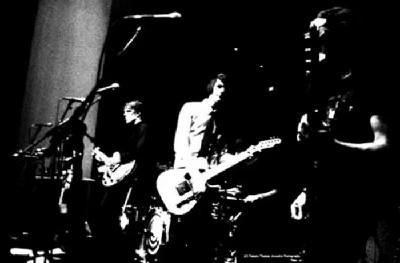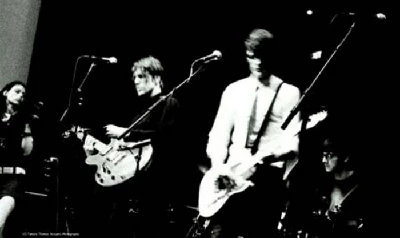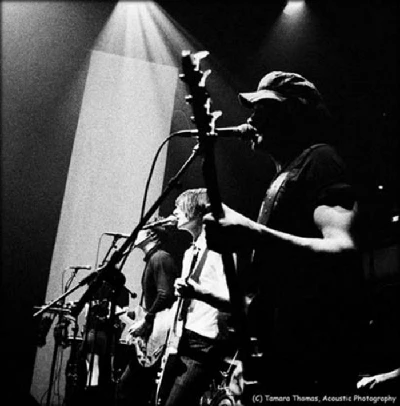Miscellaneous
-
Barfly, London, 25/5/2006
published: 23 /
5 /
2006

Australian group the Morning After Girls recently played a Kerrang-sponsored gig at a London date on their recent tour. Anthony Dhanendran is surprised that, rather than being industrial and heavy-sounding, they sound like a rockier Britpop act
Article
Perhaps Kerrang has changed a little as it approaches middle age, but it’s reasonable to expect that a Kerrang-sponsored gig, where the headliners are hard-post-rockers 65 Days of Static, should be loud through and through, industrial and heavy.
The Morning After Girls are loud, to be sure, but they’re neither of the last two adjectives. This becomes apparent the moment they take the small stage at the Barfly, where the first of their members to reach her instrument is guitarist Sasha Lucashenko who, already clutching a tambourine, is dressed in a distinctly un-metal polka dot dress.
That’s not to say the Morning After Girls aren’t good, though. Their sound is a clean and clear, sunny classic pop vibe. Their opener sounds like a rocked-up 'Pet Sounds' era Beach Boys with extra female vocals. It’s five songs and twenty minutes in, however, before anybody screams into a microphone. That’s more like it. The screamer in question is Martin Leeman, a fellow whose hair is so mathematically smooth that he appears to have ironed earlier in the day.
The reason for the sunny disposition, even when screaming into a microphone, becomes apparent halfway through the set when Lucashenko steps up to the microphone and asks, in an Australian accent, “How are we, London?”. That explains it, then – the Morning After Girls hail from a country seemingly unable to produce anything without extremely polished production values.
The two male vocalists, other guitarist Leeman and bassist Scott Von Ryper, have fairly generic rock voices, but they mesh well in harmony with Lucasshenko to create a pleasantly mellifluous sound.
A few shouty songs notwithstanding, the mood is fairly gentle throughout – think the Beach Boys with female vocals and Britpop production values. The overall aura of happiness doesn’t sit comfortably with the generally disinterested mood of contemporary British indie – which is, frankly, a welcome change.
The last two songs of the set get more interesting, however, and the band appear to morph into Mansun for the final few songs – a harder sound appears, and the distinctive prog guitars of Mansun start to come to the fore.
It’s a welcome addition to a good gig, and the Morning After Girls, while they don’t sit well in either the modern rock or indie camps, come across rather like one of the rockier Britpop bands. If that’s your bag, they’re worth a listen.
Picture Gallery:-

